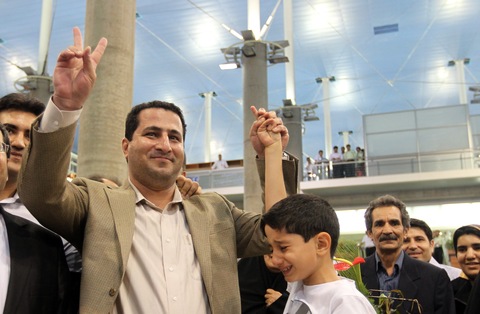Shahriari was killed immediately, but professor Abbasi and his wife sustained injuries and were transferred to hospital. Both men were professors at Shahid Beheshti University in Tehran. Resolution 1747 adopted by the United Nations Security Council in March 2007 against the Islamic Republic cited the name of Abbasi as a "nuclear scientist,
Unknown agents detonated bombs in the vehicles of Dr. Majid Shahriari and Professor Fereydoun Abbasi in separate locations on Monday morning between 7-8 a.m. local time. Shahriari was killed immediately, but professor Abbasi and his wife sustained injuries and were transferred to hospital. Both men were professors at Shahid Beheshti University in Tehran. Resolution 1747 adopted by the United Nations Security Council in March 2007 against the Islamic Republic cited the name of Abbasi as a "nuclear scientist," thus suggesting that perpetrators behind the assassination could be traced through those who included the professor's name in the UN resolution. Tehran Police Chief Brigadier General Hossein Sajedinia said a motorcycle approached Shahriari's car and attached a magnetic bomb to the driver's door of the car which exploded a few seconds later. He added that terrorists separately attached another bomb to Abbasi's car and escaped, saying while the professor and his wife were wounded in the attack they are now in good health. "Political and security analysts are wondering about the connection between these inhumane incidents and the recent remarks of the head of the British intelligence agency (MI6)…," the statement said. On October 28 John Sawers accused Iran of pursuing clandestine nuclear activities and said spying is crucial to stop Tehran's nuclear program. "Stopping nuclear proliferation cannot be addressed purely by conventional diplomacy. We need intelligence-led operations to make it more difficult for countries like Iran to develop nuclear weapons," Sawers said. The presidential office statement also referred to the "European Parliament's new stance about the necessity of removing anti-Iran terrorist groups from the US black list" and its link to the recent terrorist attack in Tehran. Last week, the European Parliament issued a declaration, urging Washington to remove the Mujahedin-e Khalq Organization (MKO) from its list of Foreign Terrorist Organizations. The European Union took the MKO off its blacklist in 2009. The terrorist group has been on the US terror list since 1997. The MKO is listed as a terrorist organization by much of the international community and is responsible for numerous acts of terror and violence against Iranian civilians and government officials. The organization is also known to have cooperated with Iraq's former dictator Saddam Hussein in suppressing the 1991 uprisings in southern Iraq and the massacre of Iraqi Kurds.

 Homepage:
http://athens.indymedia.org/front.php3?lang=el&article_id=1229718
Homepage:
http://athens.indymedia.org/front.php3?lang=el&article_id=1229718
Comments
Display the following comment